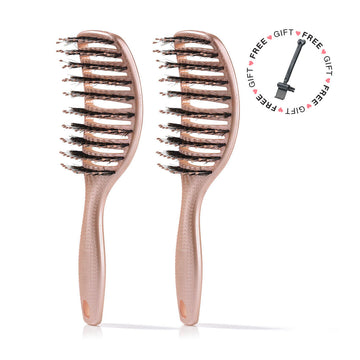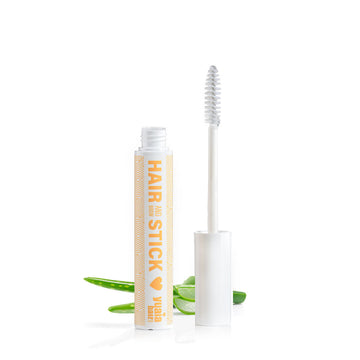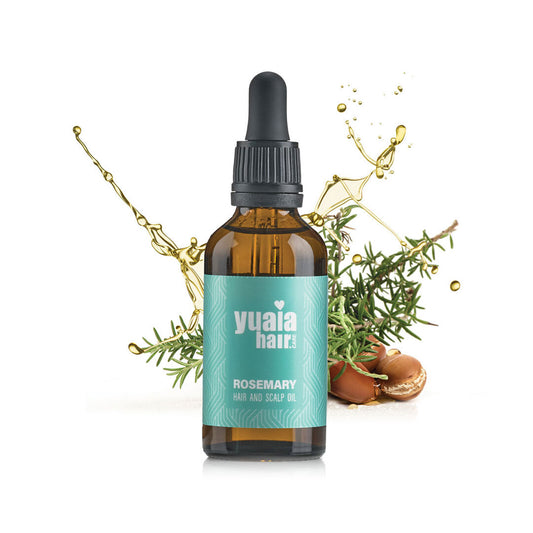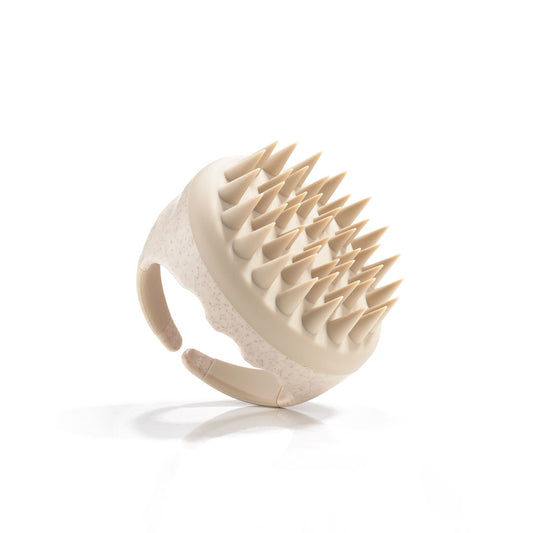
¿Con qué frecuencia se debe aplicar aceite en el cabello?
La frecuencia con la que debe usar aceite para el cabello depende de su tipo de cabello, la condición de su cuero cabelludo y su estilo de vida. Aquellas personas con cabello seco o dañado pueden beneficiarse del uso de aceite para el cabello 2-3 veces a la semana para restaurar la humedad, mientras que las personas con cabello graso pueden encontrar que una vez a la semana o cada dos semanas es suficiente.
Si su cuero cabelludo tiende a estar seco o escamoso, el uso más frecuente de aceite para el cabello puede ayudar a mantener la hidratación, mientras que un cuero cabelludo graso puede requerir un enfoque más ligero.
Sin embargo, los aceites ligeros como el de argán o el de jojoba pueden utilizarse a diario sin apelmazar ni engrasar el cabello. Estos aceites se absorben rápidamente, lo que los hace ideales para el uso diario para añadir brillo y protección. El aceite de romero también es una opción popular, ya que no solo proporciona humedad, sino que también puede estimular el cuero cabelludo y promover el crecimiento del cabello, lo que lo hace adecuado tanto para uso diario como semanal, dependiendo de las necesidades individuales.
Encontrar el equilibrio adecuado garantiza que tu cabello reciba la nutrición que necesita sin volverse grasiento ni apelmazado.
Tipo de cabello
- Entender tu tipo de cabello es esencial para determinar con qué frecuencia debes aplicarle aceite. Los diferentes tipos de cabello tienen necesidades únicas, y ajustar tu rutina en consecuencia puede ayudar a mantener un cabello sano y bien nutrido.
- Cabello seco o dañado: si tu cabello es propenso a la sequedad, la fragilidad o la rotura, aplicarle aceite 2-3 veces por semana puede ayudar a restaurar la humedad y mejorar la elasticidad. Esta rutina ayuda a reducir las puntas abiertas y previene daños mayores al fortalecer el tallo del cabello.
- Cabello graso: El exceso de grasa puede hacer que el cabello se vea grasoso rápidamente. Aplicar aceite una vez a la semana o cada dos semanas suele ser suficiente para nutrir el cabello sin sobrecargarlo. Los aceites más ligeros, como el de jojoba o el de argán, pueden proporcionar hidratación sin que el cabello parezca grasiento.
- Cabello normal: Si tu cabello no es ni demasiado seco ni demasiado graso, una rutina de aplicación de aceite semanal suele ser suficiente para mantener el brillo, la suavidad y la salud general.
- Cabello rizado o texturizado: Debido a su estructura natural, el cabello rizado y texturizado tiende a ser más seco porque a los aceites del cuero cabelludo les cuesta más bajar por los mechones. Aplicar aceite 2-3 veces a la semana puede ayudar a retener la humedad, mejorar la definición de los rizos y reducir el encrespamiento. Los aceites más pesados, como el de coco o el de ricino, pueden proporcionar una nutrición extra y mejorar la manejabilidad.
Estado del cuero cabelludo
El estado de tu cuero cabelludo es un factor clave para determinar la frecuencia con la que debes engrasarte el cabello. Un cuero cabelludo bien equilibrado favorece el crecimiento saludable del cabello, mientras que un desequilibrio puede provocar problemas como sequedad, picor o exceso de grasa.
Cuero cabelludo seco: si sientes el cuero cabelludo tirante, con escamas o picazón, es probable que necesite hidratación adicional. Engrasarte una o dos veces por semana puede ayudar a restaurar la hidratación, calmar la irritación y prevenir una mayor sequedad. Los aceites naturales como el de coco, jojoba o almendras funcionan bien para una nutrición profunda.
Cuero cabelludo graso: Si tu cuero cabelludo tiende a engrasarse rápidamente, la aplicación frecuente de aceite puede contribuir a la acumulación y la obstrucción de los poros. Aplicar aceite una vez cada dos semanas, o incluso menos, puede ayudar a mantener la humedad sin sobrecargar el cuero cabelludo. Los aceites ligeros como el de semilla de uva o el de árbol de té pueden ser beneficiosos para equilibrar la producción de sebo.
Al comprender las necesidades de su cuero cabelludo, puede crear una rutina de aceitado que favorezca un cuero cabelludo sano y nutrido, a la vez que previene los problemas comunes del cabello.
Estilo de vida y factores ambientales
Su rutina diaria y su entorno pueden tener un impacto significativo en el estado de su cabello, influyendo en la frecuencia con la que debe aceitarlo. Ajustar su rutina de aceitado para adaptarse a estos factores puede ayudar a mantener un cabello fuerte y sano.
Exposición a condiciones climáticas adversas: si vives en una zona con temperaturas extremas, vientos fuertes o mucha contaminación, tu cabello puede perder humedad rápidamente. El cabello seco y quebradizo es más propenso a romperse, por lo que el engrase frecuente (2-3 veces por semana) es beneficioso para reponer la hidratación perdida y formar una barrera protectora.
Uso frecuente de herramientas de peinado: Las herramientas de peinado con calor, como los secadores, rizadores y planchas, despojan al cabello de su humedad natural, lo que lo daña con el tiempo. Aplicar aceite antes o después del peinado puede ayudar a reparar y proteger las hebras de cabello, reduciendo el riesgo de puntas abiertas.
Tratamientos químicos: Los tratamientos de coloración, decoloración, permanente o alisado pueden debilitar la estructura del cabello, haciéndolo más susceptible a la sequedad y la rotura. El aceite restaura regularmente la humedad perdida, mejora la elasticidad y fortalece el cabello después de los tratamientos químicos.
Elegir el aceite adecuado para el cabello y el cuero cabelludo
Elegir el aceite adecuado para el cabello y el cuero cabelludo es esencial para mantener la hidratación, favorecer el crecimiento y tratar problemas específicos. Los diferentes aceites ofrecen beneficios únicos, por lo que elegir uno que se adapte al tipo de cabello y a la condición del cuero cabelludo puede marcar una diferencia significativa en la rutina de cuidado del cabello.
Aceite de romero: Conocido por su capacidad para estimular el crecimiento del cabello, el aceite de romero mejora la circulación en el cuero cabelludo, fortalece los folículos pilosos y favorece un cabello más sano y grueso. Es especialmente beneficioso para quienes experimentan adelgazamiento o crecimiento lento del cabello.
Aceite de coco: Uno de los aceites capilares más populares, el aceite de coco penetra profundamente en el tallo del cabello para proporcionar una hidratación intensa. Ayuda a reducir la pérdida de proteínas, fortalece las hebras de cabello y previene las puntas abiertas, lo que lo convierte en una excelente opción para el cabello seco o dañado.
Aceite de argán: Este aceite ligero está repleto de antioxidantes y ácidos grasos esenciales, lo que lo hace ideal para controlar el encrespamiento, añadir brillo y mejorar la elasticidad del cabello. Funciona bien para el cabello encrespado, quebradizo o teñido.
Aceite de jojoba: Muy parecido al sebo natural del cuero cabelludo, el aceite de jojoba proporciona hidratación sin engrasar el cabello. Es adecuado para todo tipo de cabello, especialmente para aquellos con cuero cabelludo graso, ya que ayuda a regular la producción natural de grasa.
Aceite de ricino: Rico en ácido ricinoleico, el aceite de ricino es conocido por sus propiedades para estimular el crecimiento del cabello. Fortalece las hebras capilares, engrosa el cabello con el tiempo y puede ser beneficioso para quienes tienen el cabello fino.
Aceite de árbol de té: con propiedades antimicrobianas y antifúngicas, el aceite de árbol de té es excelente para mantener un cuero cabelludo sano. Ayuda a combatir la caspa, reducir el picor y prevenir la acumulación, lo que lo convierte en una excelente opción para el cuidado del cuero cabelludo.
Errores comunes que hay que evitar al engrasar el cabello y el cuero cabelludo
Engrasar el cabello puede ser muy beneficioso, pero una aplicación inadecuada puede provocar acumulación, irritación o incluso daños en el cabello. Para maximizar los beneficios, tenga en cuenta estos errores comunes:
Engrasar en exceso
Aplicar demasiado aceite puede apelmazar el cabello, engrasándolo y dificultando su lavado. El exceso de aceite también puede atraer la suciedad y el polvo, lo que provoca la obstrucción de los folículos pilosos y posibles problemas en el cuero cabelludo. Una pequeña cantidad de aceite es suficiente: concéntrese en aplicar solo lo suficiente para cubrir el cuero cabelludo y el cabello sin saturarlo en exceso.
Masajear enérgicamente
Si bien masajear el cuero cabelludo es beneficioso para estimular la circulación sanguínea, usar una presión excesiva puede debilitar las raíces del cabello y provocar roturas. Realice siempre movimientos suaves y circulares con las yemas de los dedos en lugar de frotar con demasiada fuerza. Esto garantiza que el cuero cabelludo absorba el aceite sin causar estrés innecesario al cabello.
Dejar el aceite demasiado tiempo
Aunque aplicar aceite en el cabello puede proporcionar la hidratación y nutrición esenciales, dejarlo durante períodos prolongados, como durante la noche, puede tener inconvenientes. La exposición prolongada al aceite puede obstruir los poros, atraer la suciedad y provocar la acumulación de residuos en el cuero cabelludo, lo que puede causar irritación u obstaculizar el crecimiento del cabello. La mayoría de los aceites son efectivos en el plazo de 1-2 horas después de la aplicación, por lo que es recomendable lavarse el cabello dentro de este plazo para evitar la acumulación de residuos. Sin embargo, ciertos aceites, como el aceite de coco y el aceite de argán, son más ligeros y pueden dejarse durante la noche para un acondicionamiento más profundo, especialmente para personas con cabello seco o dañado. Siempre tenga en cuenta su tipo de cabello y la condición de su cuero cabelludo al decidir la duración de los tratamientos con aceite.
Aplicar aceite al cabello sucio
Aplicar aceite en el cabello sucio puede hacer más daño que bien. Cuando se aplica en un cuero cabelludo sucio, el aceite puede atrapar la suciedad, el sudor y la acumulación de productos, lo que provoca la obstrucción de los folículos, picazón e irritación. En lugar de nutrir el cabello, el aceite se mezcla con las impurezas, lo que dificulta su eliminación y puede causar problemas en el cuero cabelludo. Para obtener mejores resultados, aplique el aceite sobre el cabello limpio, seco o ligeramente húmedo para garantizar una absorción adecuada y obtener los máximos beneficios. Si su cabello tiende a engrasarse rápidamente, considere la posibilidad de lavarlo primero con un champú suave antes de aplicar el aceite para evitar la acumulación innecesaria de residuos.
Usar el tipo de aceite incorrecto
Elegir el aceite adecuado para tu tipo de cabello es esencial para evitar efectos no deseados. Los aceites pesados como el de ricino o el de oliva pueden apelmazar el cabello fino o graso, haciéndolo parecer grasiento y lacio. Por otro lado, los aceites más ligeros como el de jojoba o el de semilla de uva son más adecuados para los cueros cabelludos grasos, ya que hidratan sin obstruir los poros. Para el cabello seco o dañado, los aceites profundamente nutritivos como el de coco o el de argán pueden restaurar la humedad y la fuerza. Entender las necesidades de tu cabello y cuero cabelludo te ayudará a seleccionar el mejor aceite para obtener resultados óptimos sin causar acumulación o irritación.
3 consejos para usar aceite capilar
1. Usa una pequeña cantidad cada vez
Empieza con una pequeña cantidad de aceite capilar; unas pocas gotas suelen ser suficientes. Siempre puedes añadir más si tu cabello necesita un cuidado extra, pero eliminar el exceso de aceite es más difícil. Esto ayuda a evitar que tu cabello se vea grasiento o se sienta demasiado pesado.
2. Concéntrese en los largos y las puntas
Para obtener los mejores resultados sin apelmazar el cabello, aplique el aceite en los largos y especialmente en las puntas. Aplicar aceite en las raíces o en el cuero cabelludo puede hacer que el cabello parezca grasiento en lugar de saludable y bien nutrido.
3. Utilícelo como tratamiento intensivo
El aceite capilar también puede utilizarse como tratamiento de acondicionamiento profundo. Masajee el aceite en el cuero cabelludo y distribúyalo por el cabello, déjelo actuar durante al menos 30 minutos o toda la noche antes de lavarlo a fondo con champú. Esto proporciona una hidratación y nutrición extra, especialmente para el cabello seco o dañado.
Cómo aplicar correctamente el aceite capilar
Si se aplica correctamente, el aceite capilar puede mejorar la fuerza, el brillo y la salud general del cabello. La clave está en encontrar el equilibrio adecuado: demasiado aceite puede causar acumulación, mientras que muy poco puede no proporcionar suficiente nutrición. El tipo de cabello, el estado del cuero cabelludo y el estilo de vida influyen en la frecuencia con la que se debe aplicar aceite al cabello. El cabello seco o rizado puede necesitar aceite varias veces a la semana, mientras que el cabello graso se beneficia de una aplicación menos frecuente. Elegir el aceite adecuado también influye en la obtención de los mejores resultados. Con una rutina constante y una técnica adecuada, el aceite capilar puede ayudar a mantener la hidratación, reducir la rotura y promover un crecimiento saludable.
 Entrega en 2-4 días
Entrega en 2-4 días
 Más de 100.000 clientes satisfechos
Más de 100.000 clientes satisfechos
 Garantía de satisfacción
Garantía de satisfacción


























